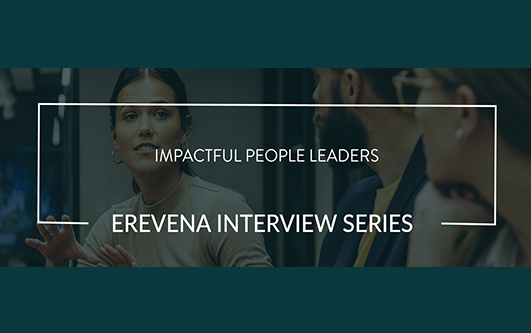Dipti Salopek, growth stage CEO coach, people leader and angel investor, talks to Erevena’s Chris Warner about the importance of building a network of peers and why the company culture and values in a scaling start-up must be embedded in every single people process.
You’re working on a ‘playbook’ for early stage CEOs – can you tell us about this?
As an executive coach working primarily with growth stage CEOs, I noticed common themes in the kinds of challenges that my clients were facing. So I decided to build a playbook to address these by interviewing more experienced CEOs and codifying their learnings, tips and advice. I’ve been in the HR field my entire career and am still constantly learning. As an executive coach, I’m able to share that learning and this new playbook is part of the process. I have learned so much from each interview. There are so many nuggets of gold that come only from experience, and some of their experiences have been jaw dropping.
What prompted your move from the corporate world to working with startups?
2012 was a pivotal year for me after more than a decade in HR roles. I was at Amex at the time, working in their merger and acquisition (M&A) function. As HR director, I project managed the integration of acquired businesses, including innovative start-ups. After two years of this, I realised that I liked the passion of the start-ups. They were ‘my’ people: nimble, agile, fun, driven. And I wanted to be part of that world. It was a wake-up moment for me. I haven’t looked back since and have been in HR leadership roles of different kinds in a variety of start-ups.
Your first foray into startups was with Criteo – how did that come about?
First, I should say that before I left the world of big corporates, I didn’t know that being a people leader would be so different in a start-up. I loved what I was doing and I loved the companies I worked for but just knew I wasn’t feeling fulfilled in the roles I had.
Criteo was founded in France in 2005 and it was after opening in the US that they took a punt on me. Interestingly, although this was essentially a start-up in the US, they weren’t looking for an innovative people leader at that time. Rather, they wanted someone with the traditional foundation blocks of HR who could stabilise them in a new market. Being headquartered in France, America was new to them, and they just needed someone who knew the market. What started out as what they thought would be a blocking and tackling HR role turned out to be a much broader strategic global opportunity, so sometimes you just have to be open to trying new things and seeing where the opportunity leads.
How did you help to shape the US business in your capacity as people leader?
It began to happen quickly and early in my time at Criteo, under the leadership of the then President of Criteo US, Greg Coleman. We built something really special and unique with the US business. All credit to Criteo in France, we were given the autonomy to do this in so many ways. Criteo had a culture that allowed for autonomy and experimentation. There was an open mindedness and willingness to try new things that I couldn’t have accessed in my past companies. That’s a phenomenal environment in which to play and feel safe. And while the broader Criteo business had a lot of sub-cultures (Criteo US being one of them), this idea of speed, experimentation and innovation was threaded throughout the company’s DNA and common to us all.
What experiences did you draw on to think differently at Criteo US?
I was still at a relatively junior place in my career, so didn’t have a lot of personal experience and ideas to draw on. Nor did I have the same level of network that I have today. So, a lot of it was coincidental and opportunistic. For example, someone in the team might get a bright spark of an idea, or we perhaps someone we’d hired would say ‘hey, in my past company we used to use this, why, don’t we try that here?’ So, it wasn’t deep strategy as much as let’s keep experimenting, tweaking, innovating, and seeing what works. And it worked for that moment.
What shaped (and continues to shape) your next career move in the high-growth world?
After five or so years at Criteo, I wanted the opportunity to step up to CPO. Etsy offered me that. It’s fair to say, however, that it wasn’t a good move for either Etsy or me, which was a lesson that continues to shape my choices today. What went wrong? I was so focused on simply being a CPO that I didn’t do the usual due diligence and ask the questions I’d ask today. In the end, that was a waste of Etsy’s time, as well as mine, because they could have hired someone who was a better fit.
Now, I’ll tell anyone who asks to do their due diligence and know what they’re looking for in a new company in terms of its philosophical alignment, culture and belief in the people function.
What value do you place on building a network?
Investing in your network is one of the most rewarding things you will do over the lifetime of your career. In a sense, my network is part of the due diligence I advocate, both for myself and other people leaders. They’re Chief People Officers with vast experience – people I can reach out to and say, ‘I’m thinking of this, how does that sound to you?’ And within minutes I’ll get five other ideas. Ultimately, your networks matter more than a lot of other things on your journey into a new role. There’s always likely to be a peer who’s spoken to someone who knows the CEO of the company you’re considering, while also knowing your values and what you’re looking for. This can give you confidence in your career choices. It’s your network that can help you think through things, evaluate your options and remind you of your moral North Star.
What do you look for in the founder/CEO of a company you’re considering?
When Erevena first suggested I speak to the founder of Snyk, a start-up with a very technical product, I thought there was no way that I’d be interested. It was way too tecchie for me. Then I met Guy Podjarny, the founder. We met for a coffee and ended up having a three-hour conversation. There was a natural connection. I probably knew from that moment that if this man had built the company, then it was the kind of company I wanted to be in. The formal interview process was long, involving 10 or 12 people but I consistently picked up exactly the same vibe of humility from all of them and a caring culture that was like nothing I’d ever experienced before.
Of course, when I interview and am assessing companies, the leadership must also value HR and care about the function. But foremost for me is a founder/CEO who cares deeply about the company. Do they have a passion for what they’re building? That’s what I found at Snyk. I speak to a lot of CEOs and founders who are ready for their glory moment as opposed to truly believing in the mission of what they’re trying to accomplish. It was different at Snyk. There is an integrity and a vision.
How can a company in high growth keep that vision and integrity as it scales?
This was something I was asked regularly when I became Snyk’s People leader. How are we going to protect our culture with so many new people coming on board? I heard this when we stood at 100 people after I joined. Then when we were 300, 500 and 1,000 people. At any point in time, more than 50% of our population was new. Yet we didn’t lose sight of our values. So, what did we get right? Our values were really strongly embedded into our culture, with people talking about them and believing in them.
In the people function, alignment with those values was in every part of our process – and this is super important. It wasn’t just about having values that looked pretty on paper, but that we were actually codifying them into all of our HR systems. They were embedded in how we recruited, how we onboarded, how communication happened from day one of a person joining us. It might be small things, like having Snyk emojis reinforcing the brand all over the place. Or bigger things like how we rewarded and recognised people. Our values were everywhere and were the glue that kept the culture strong through all of the scaling.
Is the changing economy affecting the people function and how leaders perceive it?
There’s a lot of talk about the ‘Elon Musk’ hardcore way of managing people today, but my experience is that this isn’t becoming mainstream. However, the last few years have pushed companies very much to a different extreme of excess, to the point of irresponsibility in how they have been growing and how they’ve been throwing money at problems. I think success and growth hides a lot of sins and there are many businesses that wouldn’t have survived or thrived without the free money being pumped into them. So, the correction in the market was a necessary piece for the economy – and I say this with all respect to anyone who’s lost a job as I was affected too. And I don’t think the correction is a sign that leaders care less about people. In fact, quite the opposite. I’m seeing start-up founders and CEOs who care deeply about the people part of the equation and are hiring CPOs super early in their growth – sometimes too early, to be honest. It’s a sign that they are thinking about the value of the people function and want to get that message out there.
At the same time, among the CEOs I’ve interviewed for the playbook I’m working on, I’m seeing an authenticity that perhaps we’d lost sight of. So, they are becoming more up front about their hiring needs and are willing to turn away people who are wrong for their business. They’re spelling out the challenges of a job or even their sector, not to put off people, but to ensure they attract the people who really want to work for them.
This authenticity is one of the things I look for in a founder/CEO – that alongside humility, a passion for what they’re doing and the willingness to give autonomy to their people leader!
You can access Dipti’s “Growth for Success” playbook here for guidance on how to grow and scale companies.
Share this article:












